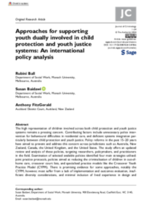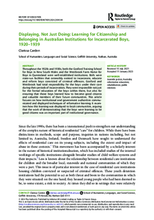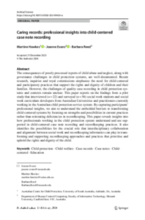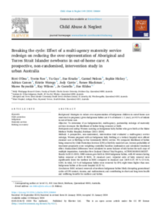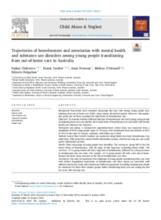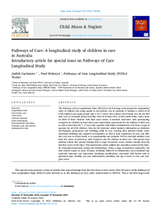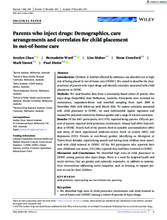Displaying 31 - 40 of 597
This study offers an updated review and analysis of policy reforms across both the child protection and youth justice systems in jurisdictions such as Australia, New Zealand, Canada, the United Kingdom, and the United States, targeting researchers, policymakers, and practitioners in the field.
The 1997 Bringing Them Home report into the removal of Aboriginal children from their families was a turning point in Australia’s history. The inquiry rejected past government policies of assimilation and endorsed the importance of keeping Aboriginal and Torres Strait Islander children with their families.
This article focuses on how institutional and government authorities communicated and displayed techniques of reformative learning in New South Wales and Queensland. It examines how this learning was displayed to local communities, arguing that the work of demonstrating that the incarcerated boys in their care were learning to be good citizens was an important part of institutional governance.
This paper reveals insights into how professionals working in the Australian child protection system understand and are supported in child-centered case note recording and recordkeeping practices. It also identifies the possibilities for the crucial role that interdisciplinary collaboration and alignment between social work and recordkeeping informatics can play in transforming and supporting recordkeeping approaches and practices that prioritise and uphold the rights and dignity of the child.
The objective of this study was to determine if an Indigenous-led, multi-agency, partnership redesign of maternity services at a maternity hospital in Brisbane, New Zealand would decrease the likelihood of Indigenous babies being removed at birth and being placed in out-of-home care..
This study explored the experiences of children and young people in the community-based support model of the Mockingbird Family, in South Australia, during implementation and roll-out. The study involved semi-structured interviews with a diverse group of 54 participants, including 21 children and young people, 12 foster carers, and 14 agency workers.
The aim of this study was to examine whether different subtypes of homelessness risk exist among young people transitioning from care in Australia and whether these trajectories of homelessness are associated with mental health and substance use disorders.
The Pathways of Care Longitudinal Study (POCLS) is the first large-scale prospective longitudinal study of children and young people in out-of-home care in Australia. It includes a cohort of all 4126 children and young people (age 0 to 17 years) who entered out-of-home care for the first time over an 18-month period from May 2010 to October 2011 in New South Wales, with a focus on 2828 of these children with final court orders.
Children as young as two are stuck living in state-run homes with paid carers despite a royal commission calling seven years ago for an end to the practice. Over the Christmas and New Year period there were hundreds of children living in these homes after being removed from unsafe families.
Children in families affected by substance use disorders are at high risk of being placed in out-of-home care (OOHC). The authors of this Australia-based study aimed to describe the characteristics of parents who inject drugs and identify correlates associated with child placement in OOHC.

